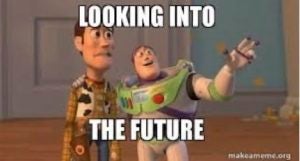How to Hire the Best Skills for the Future of Talent

There are two types of people when it comes to thinking about the future. And no picture says it better than this shot of everyone’s favorite toys, Woody and Buzz from Toy Story:

You’re either a Woody who’s a little concerned, feeling a little overwhelmed, and probably thinking, “It takes all of my willpower to live in the present.” Or you’re a Buzz who’s forever optimistic and dreams of the future because you’re already crushing the present and the future holds such promise.
Whether you’re a Woody or a Buzz, we’ve got something just for you! Over the next month, Jobvite is pulling together some of the latest data and ideas from thought leaders and experts to explore the most important skills to hire for the upcoming year and decade.
We hope you’ll see that the future is bright and by hiring the right candidates with the right skills, your organization can be prepared for the changing workforce and can succeed where your competitors struggle.
Here’s a sneak peek at some of the biggest topics and key takeaways we’ll be talking about to help your team identify, attract, and retain candidates with innovative skillsets for the future:
We’re not economists…but it’s good to start thinking about recession-proofing your workforce.
Like everyone in the business world, we wish we had a crystal ball that could tell us if or when a recession is going to hit again and how difficult it will be. But, in lieu of that, we can only look to the experts to keep us informed, and many agree that a recession of some magnitude is on the horizon.
Prepping for a recession will look different for different industries and companies, but the best thing you can do is start to take a close look at your business now, so you can begin prioritizing your most essential business objectives and needs.
Focusing on skills is a great way to determine the current candidates you want to retain and the best candidates to hire when the market becomes flooded with available jobseekers. This could mean that you start writing job descriptions that emphasize skills rather than degree requirements, which commonly results in an agile, diverse workforce because you’re looking to hire strictly on what skills a candidate brings to the table rather than experiential or degree requirements.
It will also be essential to start planning and implementing various communication tools that can reach candidates quickly, like text and social. These channels are huge for candidates that work multiple jobs or shifts, which we see in times of recession.
Get ready for the recruiting role to expand.
According to a recent IDC report, talent teams are finally starting to build the recruiting teams they’ve also dreamed about — a group of recruiters who leverage the best technology and processes, so they can spend time building connections and qualifying the best candidates.
This shift is happening because executives are investing in talent acquisition as a part of the larger business strategy, tech is becoming more readily accessible to companies of various sizes, and new tools are improving the efficiency of recruiting processes.
All these things combined are making it possible for recruiters to act as coaches and talent advisors to both the candidates they serve and the companies they work for. With all the time saved on admin tasks and system work, recruiters can focus on what matters most: growing the business and placing the right talent.
AI wants you — to stop wasting time on mundane, admin tasks.
AI is a big part of the reason recruiters’ roles are expanding, and it’s definitely going to play a large role in the future of the talent world.
When it comes to AI, Jobvite prefers to speak in terms of machine learning and automation because that’s the approach we most often use to solve our customers’ unique business challenges, but no matter what terms or functions an organization uses, it’s going to be vital for companies to hire skilled workers who have a comfort with working alongside data and AI.
We’re not saying that the future of talent belongs to data scientists and analysts, but we are saying that identifying and hiring candidates that are agile, familiar with technology, and are open to innovative solutions will be key.
It’s time to embrace the softer side of talent.
These skills of “agility” and “flexibility” are often considered soft skills. Where hard skills refer to the technical skills often gained through education and experience, soft skills point to a person’s intangible qualities and non-technical abilities.
In the past, soft skills have taken a back seat to hard skills in the business world, especially when hiring candidates. But as the world turns to AI to automate processes, the role of people and emotional intelligence is taking center stage.
Creativity and deeper critical thinking skills are becoming two of the most sought-after skills for evolving roles, and the ability to learn and develop as fast as technology will be one of the most important skills to watch for in the future.
Make sure and check back on our website and read our emails for more info about skills hiring for the future over the next month. And if you have any questions about getting started on hiring your future workforce, let’s chat!